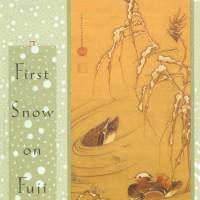"First Snow on Fuji," a collection of nine stories and one dramatic work selected by Yasunari Kawabata, was first published in 1958. The novels that would eventually be regarded as Kawabata's masterpieces had already been written, and "First Snow on Fuji" came at a turning point in Kawabata's career, a time when his international profile was growing, his role as a public figure beginning to impinge on his role as a writer.
First Snow on Fuji, by Yasunari Kawabata, Translated by Michael Emmerich.
248 pages
COUNTERPOINT PRESS, Anthology.
The aesthetics of the Japanese tearoom dictate that a single flower is more beautiful than a wasteful bouquet, and the stories of "First Snow on Fuji" are governed by the same philosophy. Kawabata's mastery of the short story utilizes the brevity of the form to accentuate the expressive power of his narratives; the clarity of his prose lends every image or motif a peculiar kind of intensity, with each aspect of the story, from title to dialogue to action, held together by a poetry that resists any reductively symbolic or allegorical reading.
After finishing one of the stories of this collection, I often felt the need to put down the book and spend some time contemplating what I had just read, the emotional undercurrents that had been building beneath the narrative resonating in the emptiness beyond the page.
In an age of decadence and excess, when so much of our engagement with the world is shallow and without meaning, writing such as that found in "First Snow on Fuji" seems more pertinent than ever.
Read archived reviews of Japanese classics at jtimes.jp/essential.

















With your current subscription plan you can comment on stories. However, before writing your first comment, please create a display name in the Profile section of your subscriber account page.